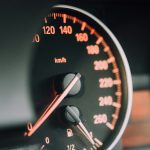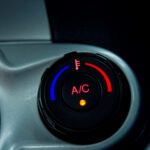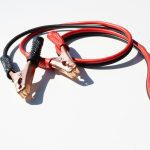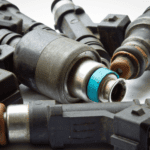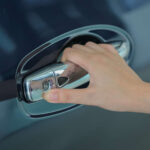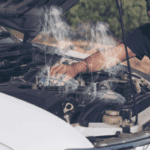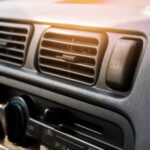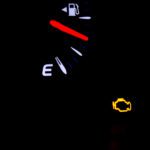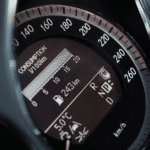Brakes that squeak can be embarrassing when you come to a stop and can make you feel a little uneasy when you press the brake pedal. However, the good news is that when brakes squeak, and the pads are still in good condition, they can be easily diagnosed and fixed without spending too much money.
It’s important to note that a brake squeak is usually a high-pitched sound that shouldn’t be confused with a grinding noise. If you hear a grinding noise, it’s a good indication that the pads are completely worn out, and the baking plate of the pads is grinding into the brake rotors. On the other hand, if you inspect a brake squeak, you’ll likely find that the pads are still in good condition; I’ve explained all the possible scenarios in this article.
Six Reasons Why Your Brakes Are Squeaking When the Pads Are Good
A common issue is a squeaking noise even when the brake pads are in good condition. As a mechanic, I often inspect brakes for random sounds and find the pads appear new. Here are six common problems I usually encounter.
Worn inner brake pad
If you are checking your brakes by looking through the wheel, you may not be able to see the inner brake pads. You must jack up your vehicle and remove the wheels to inspect them. It’s important to remember that even if you replaced all the brake pads at the same time, they wear at different rates.
Problems like the inner pad getting stuck in the caliper carrier will cause a squeaking noise. This can result in a scenario where the outer pad appears new, but the other is so worn that it is squeaking on the wear indicators, signaling a problem.
Warning indicator loose
Many vehicles are equipped with brake pad wear indicators. There are different types, but in this instance, they are the metal clip type located on the edge of the pad. These wear indicators produce a squeaking sound when the pad wears down to around 2mm. This serves as an alert to the driver to check the brakes. If the wear indicators become loose or break, they cause a constant and annoying squeaking noise.
Pad shims touching the rotor
The brake pads are situated within a caliper carrier that typically uses metal shims or locating clips made of thin, smooth metal. These components keep the pad securely in place and allow it to move freely without any restrictions so it can clamp onto the rotor when you apply brake pressure.
These metal parts can become brittle over time, which can cause them to break away. On the odd occasion, they don’t get fitted correctly when the pads are changed, so it doesn’t take much for them to work themselves loose. They score on the rotors when loose, producing a horrible metal-on-metal screeching noise when braking.
Buildup of brake dust
Excessive brake dust can accumulate and stick to various components, like the edge of the pad or the caliper carrier. A brake dust buildup in contact with the rotor can cause a squeaking noise because brake pads are made from a metal-based compound.
Usually, excessive brake dust is caused by overheated brakes or poor-quality brake pads, which causes the pad surface to become brittle and wear out quickly. This can also happen to an old set of brake pads on low-mileage vehicles because the pad surface weakens and deteriorates with age.
Worn rotors
When brake discs or rotors are worn, you can observe a shiny lip on the edge of the rotor. This is due to the pads wearing the surface of the rotor inwards. The pads do not wrap around the top of the rotors, which is why you get a lip. During a brake inspection, the thickness of the rotor is measured to determine if it falls below the vehicle-specific specification.
A Squeaking noise is produced when the edge of the pad surface catches the rotor’s lip while braking. This doesn’t happen when the brake rotors are slightly worn; it is more common in heavily worn rotors or when new pads are replaced onto old worn rotors. You can easily see the lip of the rotor through your wheels as the shinier edge of the disc. Unfortunately, the rotors need to be replaced to fix this issue, but they already require replacement due to wear anyway.
Poor quality brakes
It is critical to understand that utilizing poor quality, fake or non-OEM equivalent brakes can lead to a faster wear and tear rate, resulting in problems such as squeaking. Manufacturers of inferior-quality brakes tend to cut corners on the quantity and quality of materials used during production to reduce costs. This can lead to problems like squeaking, which would not be present if you used OEM quality pads.
When replacing the brakes at a garage, you don’t always have control over this, so it is wise to check what brands they use, which will indicate the quality. Unless you are in the motor trade, you probably won’t have heard of most brake component brands, so don’t be scared to search for them online.
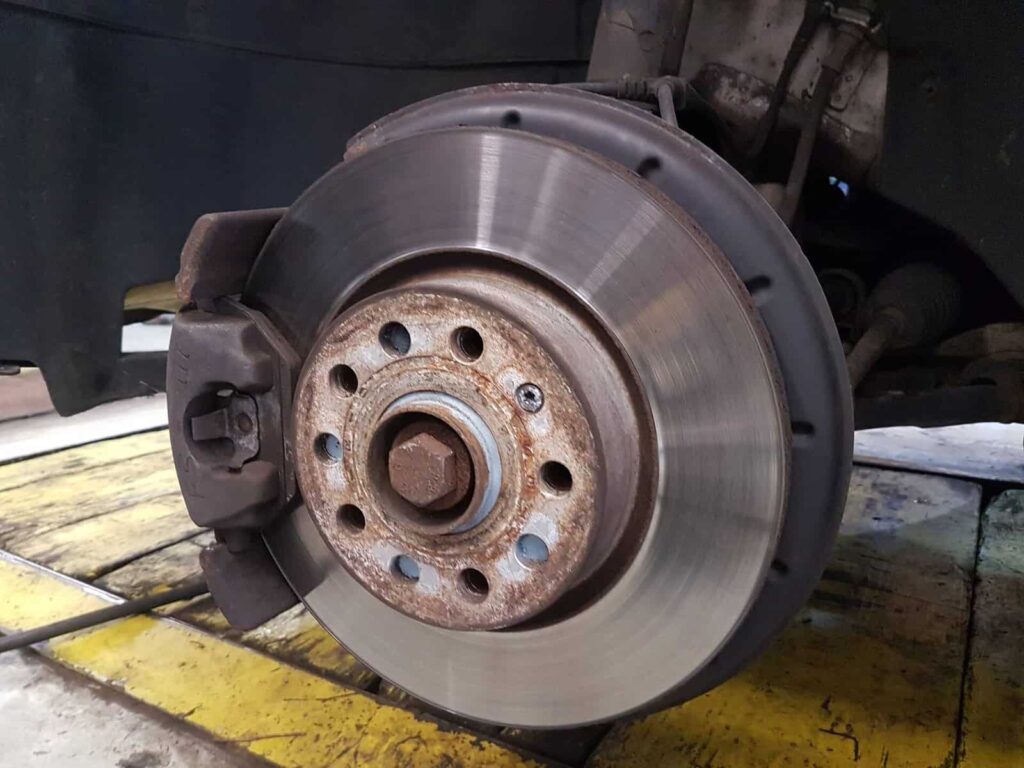
Can You Drive With Squeaking Brakes if the Pads Are Good?
I’m sure you’ve heard cars pulling up at the traffic lights and squeaking. It can be unpleasant when you’re driving. But before you decide whether to drive, you should know the cause of the squeaking. If you know the cause, you can assess whether it’s safe to drive or not. The brakes are something nobody should consider driving with if they are not in good condition.
To answer the question – can you drive with squeaking brakes? You usually can, as long as the brake pads are good. However, getting them inspected and fixed as soon as possible is crucial. If the pads are in good condition and the brakes are working correctly, even if they are squeaking, the car should stop in an emergency just as well as before the squeaking.
Inspecting and Repairing a Brake Squeaking Noise
If you hear squeaking from your brakes, inspecting them to find out what’s causing the issue is common practice. However, you might find that the braking system is fully serviceable, but there’s still a squeaking fault. This is often due to a buildup of brake dust, which can be resolved by giving the brakes a good clean.
To do this, you’ll need to remove the brake pads, clean them, apply some copper slip to the ears of the pads to help them move easier in the carrier, wind back the caliper, and refit everything. This should solve almost all of the minor issues that arise. Lastly, make sure to pump the brake pedal a few times after refitting the brakes before attempting to drive the car.
Preventing The Brakes From Squeaking
To prevent car brakes from squeaking, you can take a few steps:
- It’s essential to use high-quality brake components designed for your specific vehicle.
- Avoid excessive braking as it can lead to overheating and glazing of the brake pads, which can cause squeaking. Try to avoid sudden late braking whenever possible.
- Ensure the brake components are in good condition by frequently inspecting them.
- Keep your wheels and brakes clean and free from dirt and debris, as this can cause excessive brake dust buildup, leading to squeaking.
Frequently Asked Questions
Why Do Brakes Sometimes Squeal Until They Are Warmed Up?
Brakes squealing until warmed up is a good tell-tale sign of minor faults such as brake dust buildup. Once the excess brake dust gets warm, it tends not to scratch into rotors so much, and you don’t hear it anymore. Most other issues relating to brake squeaks don’t go away when the brakes get warm.
Can Brake Dust Cause Squeaking?
A buildup of brake dust can cause the brakes to squeak. Brake dust is a metal-based compound that sticks together to form a metallic clump that will scratch into other moving brake components, causing a squeak
Why Do My Brakes Squeak After New Pads And Rotors?
One reason for new brakes to squeak is the pads and rotors need time to properly bed in. This means the pads and rotors need time to wear down and settle into each other to create a smooth surface.
Bottom Line
The brakes squeaking when the pads are in good condition is a problem regularly inspected by all mechanics. This can be a straightforward repair. When gambling on whether you should drive or not with squeaking brakes, it can be okay to do so, but only if you have confirmed everything is in good working order. However, I strongly recommend you resolve the issue immediately.
Not only do squeaking brakes get annoying, but they can also indicate that something more sinister is about to go wrong. No amount of money is worth the peace of mind of knowing your brakes will work when you press the pedal!
